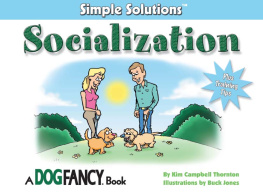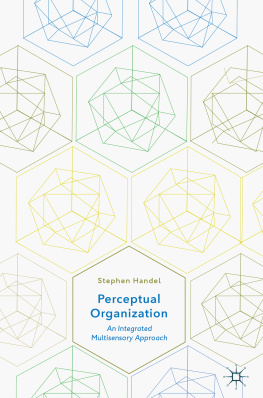ABOUT THE EDITOR
Gerald Handel is Professor of Sociology at the City College and Graduate Center, City University of New York. He is the author/coauthor/editor of: The Psychosocial Interior of the Family; The Apple Sliced: Sociological Studies of New York City; Social Welfare in Western Society; The Child and Society: The Process of Socialization; Workingman's Wife: Her Personality, World and Lifestyle; and Family Worlds. He is former Associate Editor of lournal of Marriage and Family.
First published 1988 by Aldine De Gruyter
2 Park Square, Milton Park, Abingdon, Oxfordshire OX14 4RN
52 Vanderbilt Avenue, New York, NY 10017
Routledge is an imprint of the Taylor & Francis Group, an informa business
First issued in paperback 2019
Copyright 1988 by Gerald Handel
All rights reserved. No part of this book may be reprinted or reproduced or utilised in any form or by any electronic, mechanical, or other means, now known or hereafter invented, including photocopying and recording, or in any information storage or retrieval system, without permission in writing from the publishers.
Notice:
Product or corporate names may be trademarks or registered trademarks, and are used only for identification and explanation without intent to infringe.
Library of Congress Cataloging-in-Publication Data
Childhood socialization / edited by Gerald Handel.
p. cm.
Bibliography: p.
Includes index.
ISBN 0-202-30335-7. ISBN 0-202-30336-5 (pbk.)
1. Socialization. 2. SocializationCross-cultural studies.
I. Handel, Gerald.
HQ783.C525 1988
303.3'2dc19 88-27480
CIP
ISBN 13: 978-0-202-30336-9 (pbk)
GeraldHandel
Socialization is the process by which the newborn human organism is transformed into a social person, a person capable of interacting with others. Interacting with others implies several different kinds of activitiescarrying on a conversation; forming affectionate ties; participating as a member of many kinds of organizations, such as a school classroom, a social club, a work group in a shop or office; sharing loyalty with many unknown others who are fellow citizens of a nation or fellow adherents of a church. Being a person means living in a socially organized world and knowing how to move around in some part of that world. It means knowing rules for interacting with others in various contexts and settings and having the various kinds of competence that are required in each. A newborn has the ascribed status of son or daughter but will have to transform it into an achieved status of acceptable son or daughter. Thereafter, in sequence, the child will have to gain the qualifications of an acceptable pupil in nursery school or kindergarten; an acceptable playmate to other children in neighborhood and school, and so on, to a succession of qualifications throughout the life course. Acceptability means knowing the expectations of others and being able to conduct oneself within the limits of those expectations. In all of these settings, expectations change with age, as the child is socialized to increasingly more demanding standards of knowledge, understanding, emotion, and performance.
Socialization is a process that is carried out by persons and organizations that may have official designation as agents of socialization or that may be allowed to function as such an agent. They are agents in a double sense of that term: (1) They act upon the child; and (2) they act on behalf of the larger society (or some particular segment of it that may be acceptable or unacceptable to the larger society). The principal agents in our society, and in many others, are family, school, and peer group. In addition, in the last 35 years, television has come to be considered an important agent in our society. (Churches are probably also significant agents, but, except for a few denominations such as Hutterites and Mennonites, their socialization activity has not been much studied.)
Each of these socialization agents has a somewhat different socialization impact, although there is some overlap in their efforts and impact. In some ways parents and teachers, parents and peer group, teachers and peer group may pull together; in some ways all may pull the child in different directions, offering conflicting goals, standards, expectations. Television may reinforce some aspects of each while also offering its own reality.
The socialization process is not completed in childhood. It continues through adolescence and throughout adulthood. An adult who takes a new job must be socialized into the organization. Social change presents people with opportunities or challenges to alter their beliefs, values, and actions. Major events such as the Vietnam War, the civil rights movement, the women's movement, the Watergate scandal in the Nixon Administration, the rise of AIDS as a threat to public health have led to revised beliefs and values and different actions with regard to patriotism, relationships between blacks and whites, relations between the sexes, trust in government, and standards of openness in the discussion of sexuality. Thus, there is a sense in which the outcomes of socialization are never final because later socialization can have an impact that changes the person. How much change is possible and under what circumstances is still a matter of some uncertainty. Despite this uncertainty, there is widespread agreement that childhood socializationprimary socialization, as it is called, to distinguish it from adult socializationis essential in creating the human person and in shaping the identity, outlook, skills, and resources of the evolving person. In the last 20 years or so, sociology has developed a new focus on the life course perspective and psychology on life span development, both of which give a lot of attention to how much people change in adult life. None of this discussion, however, has taken the form that "it does not much matter how children are socialized since they can always change and become whatever kind of person they want to become when they become adults." Studies of gender socialization still deal with the issue of how early socialization prevents girls from developing their full potential in adulthood, and studies of children who grow up both financially and informationally impoverished still find that socialization in such circumstances usually has lifelong consequences, a few dramatic cases to the contrary notwithstanding.
The first agents of socialization, the parents or their surrogates, ordinarily understand that they have some responsibility of preparing their child for adulthood in the society or segment of it into which s/he has been born. Whether they think about it a great deal or not at all, their actions are guided by some notion of what sort of person their child should be upon attaining adulthood. That notion, whether vague or detailed, will be influenced by the community and society in which the family lives. Social class and ethnic group are significant influences that distinguish families within a society, but other kinds of variation also affect how children are socialized.











